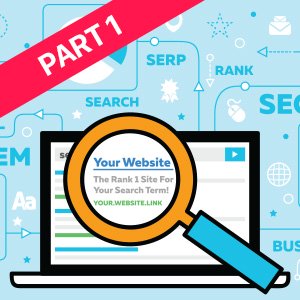If you're in the online marketing space, SEO (Search Engine Optimization) may be a word you always seem to hear every now and again.
And if you want to build a sustainable long-term business online, SEO is something you need to take a closer look at if you haven't already.
Why?
Online search is the biggest traffic source for online marketers, with 93% of online experiences starting with a search engine.
Overlooking the importance of SEO can hurt your online business in the future.
Which basically means it'll be tough to make money online if you don't know about SEO.
The thing, SEO is a very broad and technical topic.
But mastering all there is to know about SEO isn't entirely necessary.
Learning what you need to know about SEO to improve your business is what's really important.
And that's exactly what I'll be covering.
I'm going to break down SEO for you in an easy, comprehendible and actionable way, by dividing it into a four-part series covering: the basics on SEO, technical, on-page and off-page.
How does that sound?
Good?
Let's begin...
What Are Search Engines And How Do They Work?
To start off, let's cover the basic ground of SEO by defining it.
In Google's words:

Simply put, a search engine's job is to present the best information relevant to your search.
They do this by carrying two functions: crawling and indexing.
Search engine robots, known as "crawlers" are what's used to find every page on the web.
Once they crawl a page, they convert all of its data into its unique code then stores them into one massive database.
All of that information is then put into an index and selected later (based on relevancy) for a search term query.
It selects data based on two factors: relevancy and popularity.
It won't connect the search term "weight loss" with web pages based on something totally different.
Nor would it connect it with web pages that don't have to seem any form of value or high in popularity.
So to determine what information would be considered relevant and popular to the user, they use "algorithms" to pick the data that's necessary and most valuable in order from the most to least popular.
These are based on several ranking factors:

Each factor covers a number of micro areas that can be optimized for the algorithms favour.
If your site is better optimized than your competitors based on a search query, the algorithm will rank your page higher because the search engines would assume it would be more valuable to the user.
And the higher your site is ranked on the search results, the more organic traffic you receive (and the more money you make).
Google hugely dominates search traffic, receiving almost 90% of search queries worldwide. Other search engines such as Yahoo!, Bing, Baidu and AskJeeves account the rest.

The difference between the level of traffic received on from sites that are ranked #1 on Google and #5 is hugely skewed.
According to SlingShot, a site with a number #1 ranking on Google receives 18.2% of all traffic compared to #5 ranking that receives as low as 2%.

You can see how important ranking high on Google is for online marketers.
Which explains why more than $50 billion is being spent on online marketing every year.
Because search traffic is the biggest form of all, gaming its algorithm has become increasingly competitive because of just how much of an impact it has on business.
There's a range of strategies that you can implement to gain a better ranking for your site on search engines.
These methods comprise of on-page and off-page, but still contribute to improving your site's SEO and gaining an edge over competitors.
For marketers, SEO means having to take small actionable steps that readjust and better your site with the aim of skewing the algorithm in your favour.
Technical optimization covers using the right resources that are compatible with search engines and targets ranking factors.
On-page covers formatting your page to optimize a better user experience by readjusting your site in a way people enjoy and become repeat visitors.
Off-page covers building sufficient links from other sites to build trust with search engines and increase your sites popularity.
It's important you work on every area to get achieve the best results with search engines, and be rewarded with more visibility and traffic to your online business.
In a Nutshell:
Search engines work to provide answers to search queries by presenting selective data from their database.
This selective data is based on the relevance and popularity of the site, which both factors are calculated by built-in algorithms.
Relevancy and popularity are based on a range of factors, but the main goal of search engines is to rank the most relevant and popular sites first because they are believed to be the most valuable thus provide the best user experience.
Which is why ranking higher on search engines is important for online marketers because the higher you rank the more traffic you gain.
Learning strategies to gain favour of the algorithm will help to better optimize your site and increase your search rankings.
In the next part of this series, you'll learn some technical steps you can take to optimize your site.

KRISHNAKUMAR K P • 8 years ago
opal61 • 8 years ago